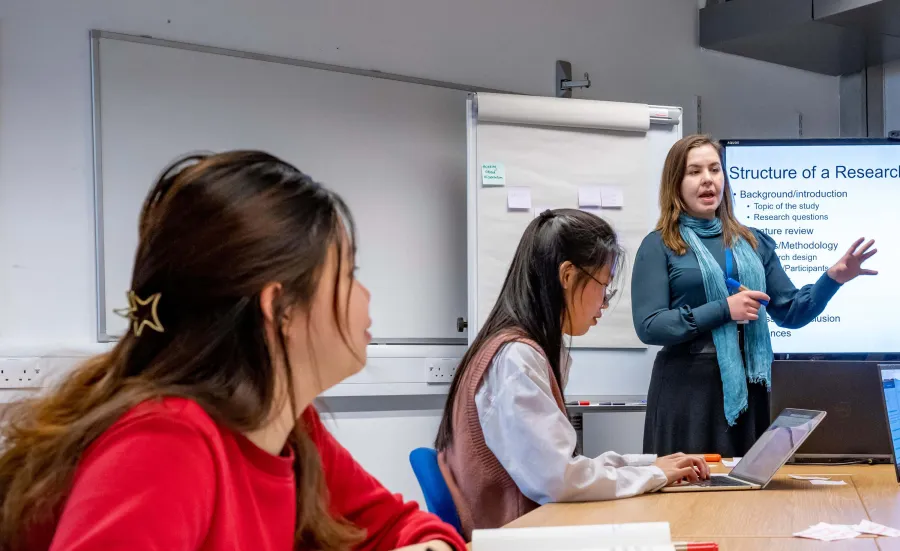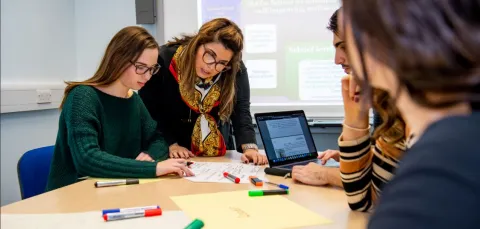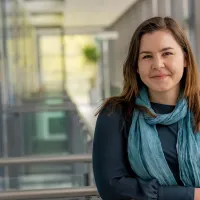About this course
Learn how theory and research informs practice and policy in education. Discover how to unlock the potential in yourself and others.
Our courses in education focus on the rigorous, scientific study of the subject. You’ll study both UK and international systems, from primary to post-compulsory education. Topics include:
- Special Educational Needs (SEN)
- Social Justice and Inclusive Education
- Curriculum Design
- Educational systems Across the World
- Digital Education: Teaching and Learning in the Age of AI
As part of your education degree you can:
- learn from and connect with leading education researchers across disciplines
- explore key topics like social justice and inclusion, digital education and AI literacy and international perspectives
- continue your studies with a master's degree in education
- get a guaranteed interview for our PGCE Primary or Secondary courses rated by OFSTED as Outstanding
- study abroad at one of our exchange partner universities
This course is for those with an interest in a broad range of education-related fields, research, public sector work or further study.
League table rankings
Education at the University of Southampton is ranked 5th in the UK (Complete University Guide, 2026).
We regularly review our courses to ensure and improve quality. This course may be revised as a result of this. Any revision will be balanced against the requirement that the student should receive the educational service expected. Find out why, when, and how we might make changes.
Our courses are regulated in England by the Office for Students (OfS).

It’s a privilege to work with young people through a football club. Sport is such a powerful vehicle to empower people – when you’re wearing the badge of a football club, they really want to get involved.

I’ve been doing an internship relating to student empowerment. It is something I’m passionate about and it helps me see what I’ve been learning about in practice within a school. It’s also given me extra experience that I can use when applying for jobs.
Course location
This course is based at Highfield.
Awarding body
This qualification is awarded by the University of Southampton.
Download the Course Description Document
The Course Description Document details your course overview, your course structure and how your course is taught and assessed.
Entry requirements
For Academic year 202627
A-levels
ABB
A-levels additional information
Offers typically exclude General Studies and Critical Thinking.
A-levels with Extended Project Qualification
If you are taking an EPQ in addition to 3 A levels, you will receive the following offer in addition to the standard A level offer: BBB and grade A in the EPQ
A-levels contextual offer
We are committed to ensuring that all applicants with the potential to succeed, regardless of their background, are encouraged to apply to study with us. The additional information gained through contextual data allows us to recognise an applicant's potential to succeed in the context of their background and experience. Applicants who are highlighted in this way will be made an offer which is lower than the typical offer for that programme as follows: BBC
International Baccalaureate Diploma
Pass, with 32 points overall with 16 points at Higher Level
International Baccalaureate contextual offer
We are committed to ensuring that all learners with the potential to succeed, regardless of their background, are encouraged to apply to study with us. The additional information gained through contextual data allows us to recognise a learner’s potential to succeed in the context of their background and experience. Applicants who are highlighted in this way will be made an offer which is lower than the typical offer for that programme.
International Baccalaureate Career Programme (IBCP) statement
Offers will be made on the individual Diploma Course subject(s) and the career-related study qualification. The CP core will not form part of the offer. Where there is a subject pre-requisite(s), applicants will be required to study the subject(s) at Higher Level in the Diploma course subject and/or take a specified unit in the career-related study qualification. Applicants may also be asked to achieve a specific grade in those elements. Please see the University of Southampton International Baccalaureate Career-Related Programme (IBCP) Statement for further information. Applicants are advised to contact their Faculty Admissions Office for more information.
BTEC
RQF BTEC
D in the BTEC National Extended Certificate plus AB from two A levels
DD in the BTEC National Diploma plus B from one A-level
DDM in the BTEC National Extended Diploma
We are committed to ensuring that all learners with the potential to succeed, regardless of their background, are encouraged to apply to study with us. The additional information gained through contextual data allows us to recognise a learner’s potential to succeed in the context of their background and experience. Applicants who are highlighted in this way will be made an offer which is lower than the typical offer for that programme.
Additional information
The University aims to recruit students from a wide range of backgrounds who we believe have the potential and motivation to succeed on our challenging programmes. We are committed to fair admissions and strive to ensure we give equal consideration to all applicants who possess the necessary knowledge and skills.
QCF BTEC
D in the BTEC Subsidiary Diploma plus AB from two A levels
DD in the BTEC Diploma plus B grade from one A-level
DDM in the BTEC Extended Diploma
BTEC contextual
We are committed to ensuring that all learners with the potential to succeed, regardless of their background, are encouraged to apply to study with us. The additional information gained through contextual data allows us to recognise a learner’s potential to succeed in the context of their background and experience. Applicants who are highlighted in this way will be made an offer which is lower than the typical offer for that programme.
Access to HE Diploma
60 credits with a minimum of 45 credits at Level 3, of which 30 must be at Distinction and 15 credits at Merit
Access Offer Contextual
We are committed to ensuring that all learners with the potential to succeed, regardless of their background, are encouraged to apply to study with us. The additional information gained through contextual data allows us to recognise a learner’s potential to succeed in the context of their background and experience. Applicants who are highlighted in this way will be made an offer which is lower than the typical offer for that programme.
Irish Leaving Certificate
Irish Leaving Certificate (first awarded 2017)
H1 H2 H2 H2 H3 H3
Irish Offer Contextual
We are committed to ensuring that all learners with the potential to succeed, regardless of their background, are encouraged to apply to study with us. The additional information gained through contextual data allows us to recognise a learner’s potential to succeed in the context of their background and experience. Applicants who are highlighted in this way will be made an offer which is lower than the typical offer for that programme.
Scottish Qualification
Offers will be based on exams being taken at the end of S6. Subjects taken and qualifications achieved in S5 will be reviewed. Careful consideration will be given to an individual’s academic achievement, taking in to account the context and circumstances of their pre-university education.
Please see the University of Southampton’s Curriculum for Excellence Scotland Statement (PDF) for further information. Applicants are advised to contact their Faculty Admissions Office for more information.
Cambridge Pre-U
D3 M2 M2 in three Principal subjects
Cambridge Pre-U additional information
Cambridge Pre-U's can be used in combination with other qualifications such as A Levels to achieve the equivalent of the typical offer
Cambridge Pre-U Offer Contextual
We are committed to ensuring that all learners with the potential to succeed, regardless of their background, are encouraged to apply to study with us. The additional information gained through contextual data allows us to recognise a learner’s potential to succeed in the context of their background and experience. Applicants who are highlighted in this way will be made an offer which is lower than the typical offer for that programme.
Welsh Baccalaureate
ABB from 3 A levels or AB from two A levels and B from the Advanced Skills Baccalaureate Wales
Welsh Baccalaureate contextual offer
We are committed to ensuring that all learners with the potential to succeed, regardless of their background, are encouraged to apply to study with us. The additional information gained through contextual data allows us to recognise a learner’s potential to succeed in the context of their background and experience. Applicants who are highlighted in this way will be made an offer which is lower than the typical offer for that programme.
T-Level
We will accept the T level in Education & Early Years. The requirements are an A in Core, Merit in Specialism and Distinction Overall.
Other requirements
GCSE requirements
Applicants must hold GCSE English language (or GCSE English) (minimum grade 4/C) and mathematics (minimum grade 4/C)
Find the equivalent international qualifications for our entry requirements.
English language requirements
If English is not your first language, you must show that you can use English to the level we require. Visit our English language pages to find out which qualifications we accept and how you can meet our requirements.
If you are taking the International English Language Testing System (IELTS), you must get at least the following scores:
IELTS score requirements
- overall score
- 6.5
- reading
- 6.0
- writing
- 6.0
- speaking
- 6.0
- listening
- 6.0
If you do not meet the English language requirements through a test or qualification, you may be able to meet them by completing one of our pre-sessional English programmes before your course starts.
You might meet our criteria in other ways if you do not have the qualifications we need. Find out more about:
- skills you might have gained through work or other life experiences (otherwise known as recognition of prior learning)
Find out more about our Admissions Policy.
Foundation programmes for international students
A foundation programme will give you the language skills and subject knowledge you need if you're not qualified for direct entry to your chosen undergraduate course.
You'll progress to your chosen course after successfully completing the foundation programme.
Find out more about undergraduate foundation programmes for international students.
Mature applicants
We welcome applications from learners of all ages. Students who are aged 21 and over at the start of their undergraduate course are defined as mature by the University of Southampton. We take a holistic assessment of the application looking for academic ability and commitment to study. Typical entry requirements, which may vary from discipline to discipline, includes for example, evidence of recent formal academic qualifications or professional qualifications, relevant work experience or volunteering. You may also be invited to attend an interview with an Admissions Tutor. For some degree programmes, there may also be a Professional, Statutory and Regulatory Body (PSRB) requirement. We accept many different academic qualifications. For more information, please contact the Admissions Team.
Got a question?
Please contact our enquiries team if you're not sure that you have the right experience or qualifications to get onto this course.
Email: enquiries@southampton.ac.uk
Tel: +44(0)23 8059 5000
Course structure
Each year you'll take 7 single modules plus a double module that runs across both semesters. We use small-group teaching and a personal tutor system to provide a supportive and friendly environment.
Your studies will include formal class time in lectures, seminars, workshops and practical sessions, as well as independent work, such as directed study, reading, assessment preparation and revision.
With our ‘Critical Observations’ modules you can visit schools and colleges and gain valuable experience. You’ll organise your own visits and we’ll provide advice and guidance.
You can choose optional modules from other subject areas. You can even learn a new language.
We offer a range of interdisciplinary modules, including 'Business Skills', 'Life in the Cosmos' or 'Understanding Modern China'. These are a great opportunity to expand your knowledge and create an impressive CV.
There is also the option to study a minor subject alongside your main degree.
Year 1 overview
You’ll take compulsory modules that will introduce you to a broad range of topics in education, including:
- Contemporary Education Issues
- Introduction to Teachers and Teaching
- Education in Other Countries
- Special Educational Needs
Year 2 overview
You’ll take a compulsory module to develop your knowledge and understanding of research methods in education.
You’ll choose your remaining modules from a wide range, including:
- Employability
- Adult Learners and Learning
- Leading and Managing in Education
- Early Years Education: Critical Observations
- Cognitive Psychology in Education
- Curriculum Design
Year 3 overview
You’ll write a dissertation on a topic of your choice within the field of education. Your dissertation supervisor will help you conduct your independent research, collect data and write up your findings.
You’ll also choose from a range of optional modules, including:
- Advanced Research Methods
- Post-16 Learning: Critical Observations
- Supporting Additional Learning Needs
- Social Justice and Inclusive Education
- Sociology of Education
- Autism Spectrum Disorders
Want more detail? See all the modules in the course.
Modules
The modules outlined provide examples of what you can expect to learn on this degree course based on recent academic teaching. As a research-led University, we undertake a continuous review of our course to ensure quality enhancement and to manage our resources. The precise modules available to you in future years may vary depending on staff availability and research interests, new topics of study, timetabling and student demand. Find out why, when and how we might make changes.
For entry in academic year 2026 to 2027
Year 1 modules
You must study the following modules in year 1:
Contemporary Education Issues, Problems and Policies
This module will provide you with a comprehensive overview of key issues and debates in contemporary education. Through studying this module, you will be introduced to some of the main approaches and concepts for understanding key contemporary education i...
Digital Society: Education and Learning
To develop your understanding, this module poses questions such as: What is the Digital Society? Will the Digital Society offer more transparency, participation and innovation? What does the Digital Society mean for education and learners? You will have ...
Education across the World
This module is about exploring education systems in a wide range of different countries. In studying this module, you will develop your skills in assessing the outcomes and inequalities of different educational systems. You will also develop your understa...
Introduction to Statistical Analysis
This prepares you for the rest of the programme and so it is intended to support you in concurrent and subsequent modules by developing your skills with the statistical analyses that are used in quantitative approaches to research. You will develop your...
Researching Learning and Education
This module aims to prepare you for the rest of the programme and so it is intended that you will develop study skills that will support you in concurrent and subsequent modules. You can expect to develop your knowledge and understanding of the complexity...
Special Educational Needs and Disability
In this module you will learn about a variety of Special Educational Needs and Disabilities (SENDs). You will look at the impact of various SENDs on a child's education and progress. The module focusses mainly on the following aspects of Special Education...
Teachers and Teaching
This module will develop your critical knowledge and understanding of aspects of the work and lives of teachers in schools and relate this to your own experience. You will develop an understanding of key themes relating to teachers, teaching and classroo...
You must also choose from the following modules in year 1:
Primary Education: Critical Observations
This module will incorporate critical observation and analysis of diverse aspects of primary education in England. You will develop your knowledge and understanding of the values and theories of primary education that underpin current practice. Your time ...
Rapid or Not? Changes in English Education
This module is about exploring English education and the changes that lead it to exist in its current form. In studying this module, you will develop your skills in identifying and discussing the impact of the different changes in English education. With...
Secondary Education: Critical Observations
This module will incorporate critical observation and analysis of diverse aspects of secondary education. You will develop your knowledge and understanding of the values and theories of secondary education that underpin current practice. Your time in scho...
Year 2 modules
You must study the following module in year 2:
You must also choose from the following modules in year 2:
Adult Learners and Learning
The module is aimed at providing a broad overview of adult learning and adult learners. It touches upon FE, HE and work based learning. It aims to explore the barriers and enablers to adult learning and how such learning is a vital part of the world of ...
Cognitive Psychology in Education
This module is designed to provide you with an overview of the human cognitive system and its principles of information processing, demonstrating how these have been applied to understanding learning at different educational levels and in different educat...
Curriculum Design
You will study approaches to curriculum design and development and examine the conceptions and models that support these processes. You will come to appreciate the complexities and issues that surround curriculum design, including the influences of stake...
Early Years Education: Critical Observations
The module will incorporate critical observation and analysis of diverse aspects of Early Years education. You will develop your knowledge and understanding of the values and theories that underpin current practice in Early Years settings. Your time in s...
Employability
This module explores the concept of employability both from a conceptual and practical perspective. It explores the many definitions and approaches to this issue, why it has gained significance in light of educational and employment changes and what this ...
Everything, everywhere, anytime - Learning in informal settings
Society often sees school as the sole site of learning. Yet people learn from a variety of sources, in a variety of places and for various reasons. The reality is that a great deal of learning takes place in the social and cultural contexts that are offer...
Internationalisation and Education
The forces of globalisation reach into all spheres of social life, including education. In this module you can expect to analyse internationalisation in education as a consequence of globalisation. You will consider how globalisation in its various dimens...
Language, Literacy and Literature in Education
In this module we will explore the critical role played by language in children's learning and how this is developed through the teaching of literacy. Within this we will explore the part played by a range of texts, including high quality children's lite...
Leading and Managing in Education
This module aims to introduce you to the core aspects of leadership and management theories. It will give you the opportunity to consider key themes related to leadership and management approaches and their impact on educational practice. This module aims...
Year 3 modules
You must study the following module in year 3:
You must also choose from the following modules in year 3:
Advanced Research Methods
This module is designed to provide you with some of the research skills required to carry out a final year dissertation in psychology. It involves developing your ability to critically evaluate and review research articles in education and psychology, and...
Exploring the Hidden Assumptions in Education
Education is closely connected to some of the most profound questions of the human experience and social life more broadly. In this module you are invited on an exciting journey to explore the ethical assumptions, truth claims, and purposes that underlie ...
Knowledge Exchange in Education
This module focuses on the knowledge exchange activities that take place between universities and educational institutions (school networks, schools, colleges). The module explores the different forms that knowledge exchange activities can take as well ...
Learning and Teaching Mathematics
This module offers an opportunity to learn about mathematics education. We explore different perspectives on the teaching and learning of mathematics drawing on research and theoretical considerations. You will also experience a range of research-informed...
Rethinking Autism
This module offers you an opportunity to learn about autism through the lens of neurodiversity. Neurodiversity offers a new perspective on our understanding of autism by emphasising the strengths and capabilities of autistic people, as well as challenging...
Social Justice & Inclusive Education
Societies are increasingly diverse nowadays. This module aims to explore the complexity of the concepts of social justice and inclusive education and how everyone can contribute towards the development of a more inclusive world. This will be achieved ...
Sociology of Education
This module offers a critical perspective on the ways in which education is organised and delivered, the values and power relationships that underpin it, and the outcomes it produces. You will be introduced to a variety of sociology of education theories,...
Supporting Additional Learning Needs: Critical Observations
This module will incorporate critical observation and analysis of educational and training provision for learners with additional needs. You will develop your knowledge and understanding of the underpinning values and theories of educational practices in ...
Learning and assessment
The learning activities for this course include the following:
- lectures
- classes and tutorials
- coursework
- individual and group projects
- independent learning (studying on your own)
Course time
How you'll spend your course time:
Year 1
Study time
Your scheduled learning, teaching and independent study for year 1:
How we'll assess you
- dissertations
- essays
- individual and group projects
- oral presentations
Your assessment breakdown
Year 1:
Year 2
Study time
Your scheduled learning, teaching and independent study for year 2:
How we'll assess you
- dissertations
- essays
- individual and group projects
- oral presentations
Your assessment breakdown
Year 2:
Year 3
Study time
Your scheduled learning, teaching and independent study for year 3:
How we'll assess you
- dissertations
- essays
- individual and group projects
- oral presentations
Your assessment breakdown
Year 3:
Academic support
You’ll be supported by a personal academic tutor and have access to a senior tutor.
Course leader
Benjamin Davies is the course leader.
Careers and employability
Employability skills
This degree will allow you to develop and evidence subject-specific and targeted employability skills. This includes the required skill set for a range of future careers, further study, or starting your own business.
The skills you can expect to focus on and gain from this course include:
- Research
- Critical thinking
- Self-management
- Communication
- Teamwork
- Networking
- EDI leadership
The employability and enterprise skills you'll gain from this course are reflected in the Southampton skills model. When you join us you'll be able to use our skills model to track, plan, and benefit your career development and progress.
Download skills overview
Career pathways
Graduates commonly work in a range of organisations or sectors including:
Business,
Child care,
Education,
Health and social work,
Hospitality,
Public Administration,
Retail,
Real estate,
Youth and Community.
- English as a foreign language teacher
- Nursery practitioner
- Primary school teacher
- Secondary school teacher
- Special educational needs teacher
- Supply teacher
- Teaching assistant
- Business administrator
- Careers adviser
- Community education officer
- Child psychotherapist
- Counsellor
- Educational psychologist
- Family support worker
- Play therapist
- Private tutor
- Youth worker
- Primary school teacher
- Assistant psychologist
- Secondary school teacher
- Learning support assistant
- Safeguarding officer
- Special needs assistant
- Work coach
- Teaching assistant
- Support worker
Job prospects for BSc Education graduates
*Example graduate job titles and job prospect statistics taken from The Graduate Outcomes Survey, which gathers information about the activities and perspectives of graduates 15 months after finishing their course.

Year in employment
You can apply for a year in employment placement on this course. This is a great way to improve your employability and confidence in your career prospects. Recommended by 100% of students who've taken part, you can apply for a UK or global placement in any sector.
Careers services and support
We are a top 20 UK university for employability (QS Graduate Employability Rankings 2022). Our Careers, Employability and Student Enterprise team will support you. This support includes:
- work experience schemes
- CV and interview skills and workshops
- networking events
- careers fairs attended by top employers
- a wealth of volunteering opportunities
- study abroad and summer school opportunities
We have a vibrant entrepreneurship culture and our dedicated start-up supporter, Futureworlds, is open to every student.
Your career ideas and graduate job opportunities may change while you're at university. So it is important to take time to regularly reflect on your goals, speak to people in industry and seek advice and up-to-date information from Careers, Employability and Student Enterprise professionals at the University.
Fees, costs and funding
Tuition fees
Fees for a year's study:
- UK students pay £9,535.
- EU and international students pay £24,800.
What your fees pay for
Your tuition fees pay for the full cost of tuition and all examinations.
Find out how to:
Extra costs you might have to pay
You’ll be responsible for paying certain costs not covered by the tuition fee. These include:
- Disclosure and Barring Service (DBS) certification costs
- study abroad and exchange fees
- personal computer or laptop and data storage devices
- books that are not available in the library
- equipment and materials used in projects
- costs related to modules from different courses
Accommodation and living costs, such as travel and food, are not included in your tuition fees. There may also be extra costs for retake and professional exams.
Explore:
Bursaries, scholarships and other funding
If you're a UK or EU student and your household income is under £36,200 a year, you may be able to get a University of Southampton bursary to help with your living costs. Find out about bursaries and other funding we offer at Southampton.
If you're a care leaver or estranged from your parents, you may be able to get a specific bursary.
Get in touch for advice about student money matters.
Scholarships and grants
You may be able to get a scholarship or grant to help fund your studies.
We award scholarships and grants for travel, academic excellence, or to students from under-represented backgrounds.
Support during your course
The Student Hub offers support and advice on money to students. You may be able to access our Student Support fund and other sources of financial support during your course.
Funding for EU and international students
Find out about funding you could get as an international student.
How to apply
What happens after you apply?
We will assess your application on the strength of your:
- predicted grades
- academic achievements
- personal statement
- academic reference
We'll aim to process your application within 2 to 6 weeks, but this will depend on when it is submitted. Applications submitted in January, particularly near to the UCAS equal consideration deadline, might take substantially longer to be processed due to the high volume received at that time.
Equality and diversity
We treat and select everyone in line with our Equality and Diversity Statement.
Got a question?
Please contact our enquiries team if you're not sure that you have the right experience or qualifications to get onto this course.
Email: enquiries@southampton.ac.uk
Tel: +44(0)23 8059 5000
Related courses
Education (BSc) is a course in the Education subject area. Here are some other courses within this subject area:


